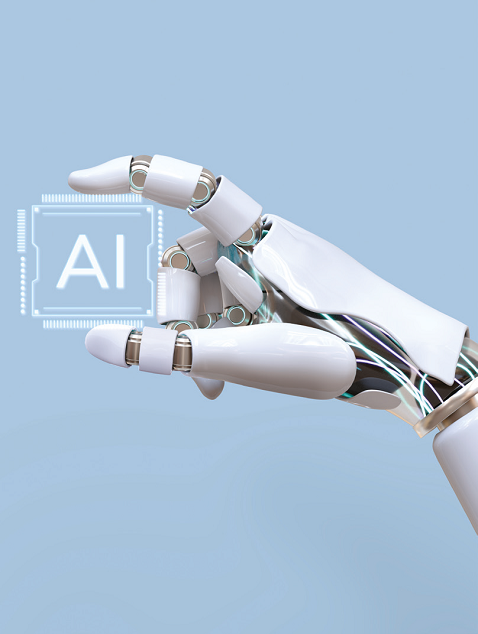Listen to the audio version of this article. Duration: 6 minutes.
Artificial intelligence is impacting all areas of society, from production organisations to public institutions, as well as communication, healthcare, and private life. This silent revolution is set to redefine the human-machine relationship permanently.

Artificial Intelligence plays a pivotal role in the development of smart homes, where it is integrated into security systems and energy management, as well as household appliances that enable remote control and independent operation. Popular voice assistants such as Siri, Alexa, and Google Assistant are also powered by AI. Indeed, there is no sector untouched by intelligent technologies. AI’s growth (through machine learning and deep learning) is tightly linked to big data, vast quantities of information gathered by modern organisations, requiring ever more sophisticated technologies to extract value and turn it into comprehensible insights.
Among the key applications combining AI and big data is image recognition, used in various fields, from safety to healthcare, relying on national and global image databases. Voice recognition, found in everyday devices, is expected to further evolve, enabling more natural interaction between humans and machines. Autonomous driving is another significant development, made possible through real and synthetic data analysis, which helps to refine AI-driven systems for both personal and commercial vehicles. Additionally, hyper-personalised products, shaped by the analysis of large datasets from past user behaviour, are bringing products ever closer to fulfilling users’ needs and preferences.
The applications of AI
Artificial Intelligence solutions influence nearly every sector of the economy and society. Below are some key areas where AI has provided revolutionary advancements to human activities:
Healthcare and Medicine
AI significantly benefits the medical field, especially in establishing diagnoses based on clinical data. Its capacity to rapidly process and compare vast amounts of information allows doctors to shorten the time required for research, enabling quicker, more personalised care.
Finance and Insurance
AI is transforming the finance and insurance industries by automating manual processes. It enhances efficiency in tasks such as data analysis, forecasting, investment, risk management, and fraud detection. AI-driven chatbots are also widely used to provide customer service and after-sales support.
Design Thinking
In all organisations, design thinking is a problem-solving approach that uses a creative vision involving the participation of all company resources. AI applications are a valuable aid in processing and aggregating data, supporting the work of managers and teams involved in the process. In particular, Generative AI, such as ChatGPT, proves to be a useful tool for stimulating solution development. Generative AI applications are also gaining prominence in the communications sector: video and image generation platforms are making traditional photo shoots for catalogues and advertisements obsolete, and in some areas, generative AI is even being used to produce written content for publications.
IoT
In the Internet of Things (IoT) universe, Artificial Intelligence plays a vital role in enabling connected functionalities. From smart homes that are remotely managed to appliances that learn users' habits, and on to Smart Factories and smart cities, AI technologies such as machine learning are becoming increasingly prevalent in meeting the evolving needs of businesses and consumers.
eCommerce and Retail
AI applications are increasingly prevalent in retail, particularly in digital channels like e-commerce sites, where chatbots assist customer interactions and recommendation systems suggest products based on previous purchases, influencing decision-making. Virtual try-on solutions, which combine AI and Augmented Reality, are also on the rise, allowing users to simulate trying on items. In physical stores, AI-powered dressing rooms equipped with transparent touch displays provide real-time product information, understand preferences, and showcase items aligned with those preferences.
Cybersecurity and Privacy
AI is instrumental in enhancing the security and protection of user data and privacy. In cybersecurity, AI detects and prevents inconsistencies in network traffic, processes vast amounts of data from multiple sources, and automates responses to potential incidents, reducing human labour and error. Detection and response systems (TCS) are employed to monitor and block cyber threats such as malware and ransomware.
"There is no sector untouched by intelligent technologies"
.png)
AI: how it works
Artificial intelligence operates through four distinct functional levels, each enabling it to perform specific tasks:
1.Understanding
This involves AI’s ability to learn and simulate the relationships between various types of data (text, images, audio, video, voice) to process specific information based on a given request.
2.Reasoning
AI uses logical reasoning, autonomously connecting the collected data through a series of carefully programmed mathematical algorithms.
3.Learning
This refers to AI’s capacity to analyse input data and generate the correct output. For instance, machine learning (ML) systems use specialised techniques to learn from an information context and are employed to execute specific tasks.
4.Interaction
AI’s capability to interact with humans is facilitated by human-machine interaction (HMI) systems. One example is Natural Language Processing (NLP), a set of AI algorithms that allows verbal communication between humans and machines, as seen in advanced chatbots.
Copyright © Homa 2025
All rights reserved

.jpg?VGhlIFBlcmZlY3QgU2xvdC1pbijmraPnoa4pLmpwZw==)

































